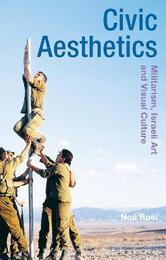
|
Civic Aesthetics: Militarism, Israeli Art and Visual Culture
Paperback / softback
Main Details
Description
Awarded an Honourable Mention by the Association for Israeli Studies. Exploring the politics of the image in the context of Israeli militarized visual culture, Civic Aesthetics examines both the omnipresence of militarism in Israeli culture and society and the way in which this omnipresence is articulated, enhanced, and contested within local contemporary visual art. Looking at a range of contemporary artworks through the lens of "civilian militarism", Roei employs the theory of various fields, including memory studies, gender studies, landscape theory, and aesthetics, to explore the potential of visual art to communicate military excesses to its viewers. This study builds on the specific sociological concerns of the chosen cases to discuss the complexities of visuality, the visible and non-visible, arguing for art's capacity to expose the scopic regimes that construct their visibility. Images and artworks are often read either out of context, on purely aesthetic or art-historical ground, or as cultural artefacts whose aesthetics play a minor role in their significance. This book breaks with both traditions as it approaches all art, both high and popular art, as part of the surrounding visual culture in which it is created and presented. This approach allows a new theory of the image to come forth, where the relation between the political and the aesthetic is one of exchange, rather than exclusion.
Author Biography
Noa Roei is Assistant Professor in the Comparative Literature and Cultural Analysis department at the University of Amsterdam, the Netherlands and a research fellow at the Amsterdam School of Cultural Analysis.
ReviewsCivic Aesthetics is an original contribution to an understanding of the links among culture, art, and militarism. Roei skillfully employs a complex academic and artistic perspective in order to problematize the very basic questions of art and Israeli identity. This book will surely serve as a worthwhile resource for scholars from a diverse range of disciplines. * Israel Studies Review * Noa Roei's Civic Aesthetics traces the evolution and the centrality of militarism in post 1948 Israeli art and visual culture. Engaging closely with and offering nuanced readings of a wide-range of artworks including: paintings, photography, exhibit catalogues and other visual installations, the book exposes the 'open secret' of militarism as the key feature, governing and dictating the constitution of much of Israel's visual artistic production. It is a must-read for anyone who wishes a better understanding of the intricate relationship between politics and aesthetics, the military and the civic, as well as the visible and invisible in the context of today's and yesterday's visual culture in Israel. * Gil Z. Hochberg, Professor of Comparative Literature and Gender Studies, University of California, Los Angeles, USA * Civic Aesthetics is a highly original and profoundly significant publication that enhances our understanding of contemporary Israeli art, culture and society. Roei's rigorous multidisciplinary scholarship is embedded within a nuanced theoretical framework, as she cogently demonstrates how various military 'components' manifest themselves within Israeli visual culture, both explicitly and implicitly. Roei's subtle understanding of how visible or invisible contexts or 'framing devices' shape vision itself -- exposing sights, oversights, and blind spots - and her examination of the simultaneous complicity and criticality inherent in cultural artifacts and practiced by artists and viewers alike - present eye-opening issues vis-a-vis the complexities that bind art and politics. Roei's lucid and fascinating text concerning Israeli culture, goes well beyond its specific locus, and offers a prime example of the poignancy and potency of "visual epistemology" as a mode of knowing and understanding. * Gannit Ankori, Professor of Art History and Theory, Brandeis University, USA *
|